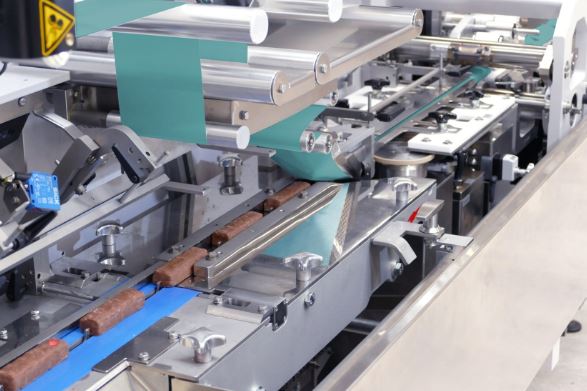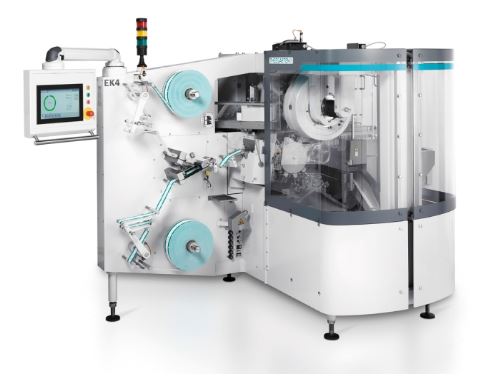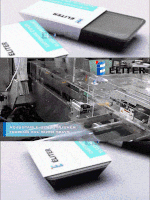Theegarten-Pactec: innovative wrapping machines for industrial processing of sustainable casings
2024-02-14
The trend towards sustainability persists and has long gone from being a secondary issue to becoming a global movement. While the political sector and a growing number of consumers appreciate environmentally friendly packaging, the processing of new materials remains a challenge in some respects. Innovation-driven company Theegarten-Pactec in Dresden, Germany, is constantly improving its high-speed wrapping machines to make it easier for manufacturers and brand owners alike to industrially process sustainable packaging materials for confectionery and products. non-food.
Despite crises, rising costs and inflation, consumers appreciate environmentally friendly packaging. According to the study published in June 2023 ‘Sustainable Product Packaging’, by the global consultancy Simon-Kucher & Partners, no less than 62% of consumers consulted in Germany would accept a price increase of up to 7% of the sustainably packaged products. Although customers are willing to purchase, the challenges for manufacturers and owners of confectionery brands who wish to switch to environmentally friendly packaging materials are of a different nature. It turns out that sustainable packaging materials are often a challenge in the packaging process.

Image 1: Theegarten-Pactec has thus developed the FPC5 (a high-performance modular wrapping machine for chocolate bars and tablets in tubular bags) that can process paper-based wrapping materials and recyclable monosheets.
Sustainable materials: suitable for recycling, but also demanding
Various materials such as plastics, metals and foil-bonded papers are typically used as packaging media to achieve an ideal combination of rigidity, flexibility and shielding for product protection. In relation to the sustainability of these materials, however, they are problematic, since they can only be separated with difficulty or not at all, so they are not recyclable either. Currently, single material or paper-based packaging materials, which are more suitable for recycling, are preferably available as alternatives. On the other hand, these materials are a challenge in the packaging process. They can tear more easily, are more difficult to seal or fold.
Theegarten-Pactec wants to support manufacturers and brand owners towards greater sustainability. For this reason, the small confectionery packaging specialist in Dresden (Germany) constantly develops its wrapping machines and consistently focuses on those improvements that allow even sustainable materials to be industrially processed.

Image 2: With the EK4, hard candies can ideally be processed with recyclable, wax-free paper, even at a wrapping speed of up to 2,300 products per minute.
Patented preheating section for paper-based tubular bags
As an example, Theegarten-Pactec has remodeled its FPC5 high-performance wrapping machine for stick and tablet products so that it can process paper-based tubular bags both by means of the usual cold sealing process and by means of the heat sealing process, which is much more complex. Specifically, the machine can produce tubular bag wrappers based on barrier paper with integrated heat sealing and a minimum pure paper content of 95%.
Preheating the sealing zone transfers a high initial temperature to the paper upon unrolling so that, in the sealing process itself, heat has to be transferred to the wrapping material by the sealing tools for a much shorter period of time. . This prevents damage to the packaging material and the product, as it passes through the machine well protected. Furthermore, thanks to the short sealing, the high speed of 100 m/min is achieved with paper-based wrapping materials.
The special properties of the sustainable packaging material have also been taken into account in another way: Theegarten-Pactec has modified the forming projection for the production of tubular paper bags with the FPC5. With the material used and the geometry adapted to the wrapping material, the danger of the paper bending or even tearing when producing the tubular bag is avoided.

Image 3: Suction sealing process developed by Theegarten-Pactec: the wrapping material is sucked by the effect of an underpressure to the sealing group.
In this way, direct contact of the wrapping material with the product is avoided and, consequently, indentations caused by pressure on the chocolate and other damage are avoided.
High speed recyclable paper processing with double twist
Aside from this, Theegarten-Pactec focused on sustainability in relation to its EK4 high-performance machine. At a wrapping speed of up to 2,300 products per minute, it can double fringe wrap hard candies with wax-free recyclable paper. Despite the high speed range required, the paper can be processed reliably so that, as far as speed is concerned, it is at the same performance levels as conventional wrapping materials.
The flexible processing of wax-free paper or other innovative packaging materials is achieved, among other things, thanks to the continuously variable adjustment of the oscillation of the rotating grippers. The twist angle can be variably adjusted. In addition, rotating grippers are available in appropriate models for various wrapping materials. The fact that the EK4 operates with great material savings also makes its contribution to sustainability. A servomotor-driven wrapping material feeding device ensures precise feeding length and thus reduces wrapping material consumption to a minimum. With its EK4, the wrapping machine specialist convincingly demonstrates that wax-free, recyclable paper can be used without any reduction in performance or product protection.

Image 4: Theegarten-Pactec’s high-performance machines package confectionery products in recyclable packaging materials based on paper or monofilms.
Suction sealing for more environmentally friendly packaging of chocolate-based products
On the occasion of the invention of the so-called suction sealing process, Theegarten-Pactec placed special focus on monofilms, which are more environmentally friendly. The background to this idea is the fact that recyclable monomaterials have poor closed folding properties, that is, the envelope has to be sealed or glued after folding. In this procedure, however, there is a risk that the sensitive chocolate will be damaged. For this reason Theegarten-Pactec has developed a sealing station located just after the packaging phase. As soon as a product enters the sealing station, the sealing group approaches a distance of 0.5 to 1 mm from the product to be sealed and the container is sucked onto the seal due to an underpressure. This prevents direct contact between the wrapping material and the chocolate product during the sealing process, thus preventing indentations in the product due to pressure or other damage. The active cooling of the environment provides additional safety for the product.
Markus Rustler, Managing Director of Theegarten-Pactec, explains: “The examples above show that we must focus on various aspects in order to consciously act sustainably. We strive to constantly develop our machines, taking into account both the preservation of the “environment as well as the expectations of our customers. Only if we are able to enable the industrial processing of sustainable packaging materials will they be able to prevail widely and throughout the world.”




